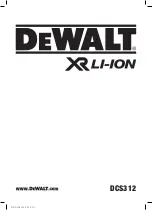
- 11 -
g
!
!
IMPORTANT! The keyhole saw has a specific
blade that makes it suitable to cut wood, plastic,
pipes or sheet metal with low carbon content,
aluminium profiles, plasterboard and bricks.
Any other use is prohibited.
These instructions contain information deemed
necessary for proper use, knowledge and
standard appliance maintenance. They do not
report information on techniques for working
with various materials. The user will find more
information in books and specialised publica-
tions or by attending courses.
COMPONENTS
Refer to fig. A and the following figures, attached
to these instructions.
1 On/Off switch
2 Blade stroke number regulator
4 Rear handgrip
5 Front handgrip
6 Motor air vents
7 Blade
8 Adjustable guide panel
9 Blade coupling/release device
10 Guide panel coupling/release/adjustment
device
1 Power supply plug and cable
12 Cutting head rotation device
13 LED light
14 Switch ON retainer device
SYMBOLS
Carefully observe the symbols in fig. B and
memorise their respective meanings. Correct
interpretation of the symbols allows a safer use
of the machine.
1 Model, technical data, manufacturing batch
number.
2 Double electric insulation.
3 CE marking
4 Electric and electronic waste may contain
potentially hazardous substances for the
environment and human health. It should
therefore not be disposed of with domestic
waste, but by means of differentiated
collection at specific centres or returned to
the vendor in the event of purchasing a new
identical appliance. The illegal disposal of
waste will result in administrative sanctions.
INSTALLATION
!
!
IMPORTANT! The manufacturer is not
liable for any direct and/or indirect damage
caused by incorrect connections.
!
!
IMPORTANT! Before you perform the
following steps, make sure that the plug is
disconnected from the AC power supply.
!
!
IMPORTANT! Wear protective gloves.
TRANSPORT
Always remove the blade and use the packaging
or case (where provided) when transporting the
tool; this will protect it from impact, dust and hu-
midity which can compromise normal operation.
HANDLING
Firmly grasp both hand grips without using the
switch; keep the tool well away from your body
and after using, place it down gently.
SWITCHING ON
When choosing where to use the power tool, the
following should be considered:
- that the place is not damp and is protected
from the weather
- that there is a large operational area free from
obstructions
- there needs to be good lighting
- that the premises are well ventilated or
equipped with a forced air extraction system
to eliminate cutting waste dispersed into the air
- that it needs to be used close to the general
differential switch
- that the power supply system is earthed and
conforms to the standards (only if the power
tool is class 1, which is equipped with an earth
cable plug)
- that the room temperature is between 10° and
35 °C
- the environment is not in a flammable/explosive
atmosphere
Take out the machine and its components and
visually check that they are perfectly intact; then
proceed to thoroughly clean them.
BLADE AND GUIDE PANEL ASSEMBLY AND
REGULATION (fig. C-D)


































